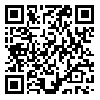Volume 11, Issue 1 (Jan & Feb 2021)
J Research Health 2021, 11(1): 1-10 |
Back to browse issues page
Download citation:
BibTeX | RIS | EndNote | Medlars | ProCite | Reference Manager | RefWorks
Send citation to:



BibTeX | RIS | EndNote | Medlars | ProCite | Reference Manager | RefWorks
Send citation to:
Khamisabadi M, Mirmehdi S R, Merati A R. Relationship of Academic Vitality, Academic Self-efficacy, and Metacognitive Skills with Lifelong Learning Concerning Mediating role of Study Approaches. J Research Health 2021; 11 (1) :1-10
URL: http://jrh.gmu.ac.ir/article-1-1467-en.html
URL: http://jrh.gmu.ac.ir/article-1-1467-en.html
1- Department of Educational Sciences and Psychology, Payame Noor University, Tehran, Iran.
2- Department of Educational Sciences and Psychology, Payame Noor University, Tehran, Iran. ,alirezamerati@pnu.ac.ir
2- Department of Educational Sciences and Psychology, Payame Noor University, Tehran, Iran. ,
Abstract: (5445 Views)
Background: Nowadays, learning is one of the most important factors in the lives of human beings. Lifelong learning and its effective variables are the topics of discussion in the contemporary era. In this regard, the present study was done to investigate the relationship between academic vitality, academic self-efficacy, and metacognitive skills, and lifelong learning concerning the mediating role of study approaches among students of Payame Noor University, Kangavar branch in the academic year 2016-2017.
Methods: A random sampling method was used to select the participants. The sample size was determined to be 168 students. The required data were collected using the Academic Vitality Inventory, the Self-efficacy Scale, the Metacognition Questionnaire-30 (MCQ-30), Approaches and Study Skills Inventory for Students (ASSIST), and the Lifelong Learning Inventory. In total, 128 questionnaires were completely filled out and collected.
Results: The results were analyzed using the Pearson Correlation and Structural Equation Modeling (SEM) using PLS and SPSS v. 20 software. The results showed that the model suitably fitted the data. The main research hypothesis was accepted at the 0.002 significance level. Academic self-efficacy, study approaches and skills, and metacognitive skills were directly correlated with lifelong learning (r=0.436, p=0.001).
Conclusion: Education and emphasis on study give incentives for lifelong learning. In a normal situation, no relationship was found between lifelong learning and other factors.
Methods: A random sampling method was used to select the participants. The sample size was determined to be 168 students. The required data were collected using the Academic Vitality Inventory, the Self-efficacy Scale, the Metacognition Questionnaire-30 (MCQ-30), Approaches and Study Skills Inventory for Students (ASSIST), and the Lifelong Learning Inventory. In total, 128 questionnaires were completely filled out and collected.
Results: The results were analyzed using the Pearson Correlation and Structural Equation Modeling (SEM) using PLS and SPSS v. 20 software. The results showed that the model suitably fitted the data. The main research hypothesis was accepted at the 0.002 significance level. Academic self-efficacy, study approaches and skills, and metacognitive skills were directly correlated with lifelong learning (r=0.436, p=0.001).
Conclusion: Education and emphasis on study give incentives for lifelong learning. In a normal situation, no relationship was found between lifelong learning and other factors.
Type of Study: Orginal Article |
Subject:
● Psychosocial Health
Received: 2017/10/6 | Accepted: 2019/04/4 | Published: 2021/02/1
Received: 2017/10/6 | Accepted: 2019/04/4 | Published: 2021/02/1
| Rights and permissions | |
 |
This work is licensed under a Creative Commons Attribution-NonCommercial 4.0 International License. |









